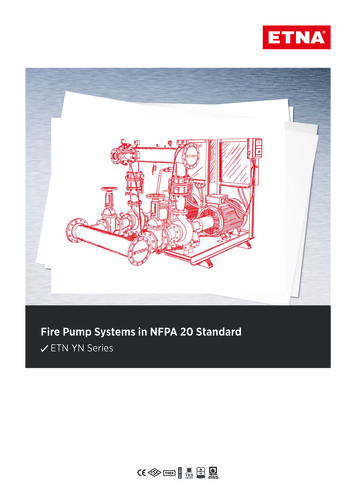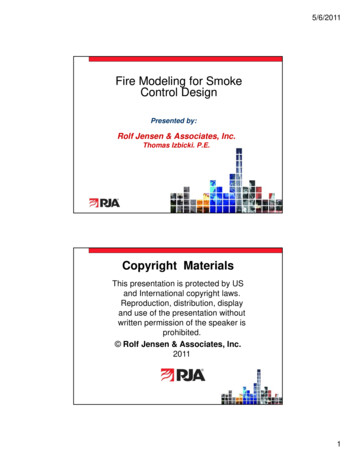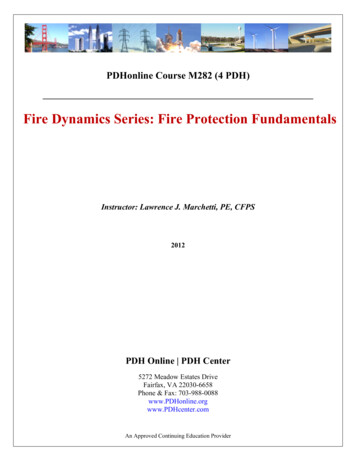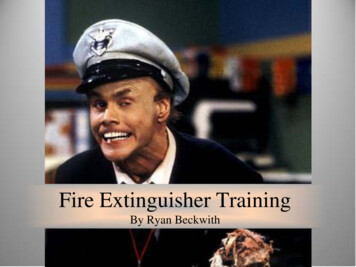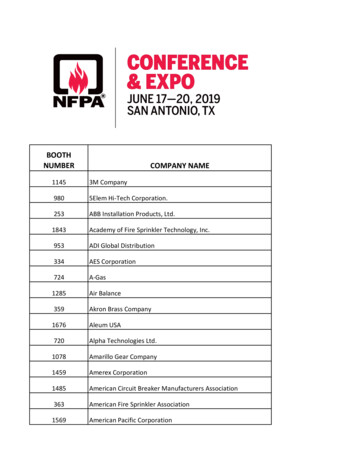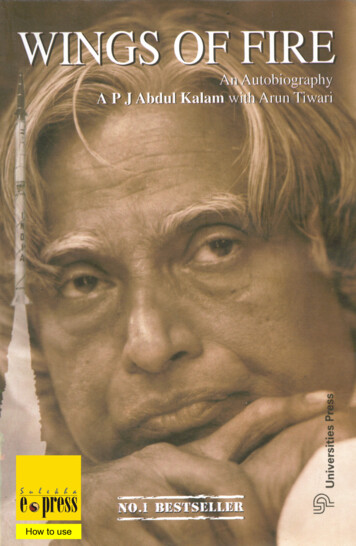
Transcription
e pressHow to use
How to use this eBookPresentsWINGS OF FIREPublished byUNIVERSITIES PRESS (INDIA) PRIVATE LIMITEDCopyright 2003UNIVERSITIES PRESS (INDIA) PRIVATE LIMITEDAll Rights ReservedDistributed bySulekha Epresse pressSulekha, Sulekha.com, Epress, Sulekha Epress, Epress logo andSulekha logo are trademarks of Smart Information Worldwide Inc.NOTICE: This eBook is licensed to the original purchaser only. Duplicationor distribution to any person via email, floppy disk, network, print out, orany other means is a violation of International copyright law and subjectsthe violator to severe fines and/or imprisonment. This book cannot belegally lent or given to others without the written permission of Sulekha.CONTACT US:Sulekha, 4926 Spicewood Springs Road, Suite 101Austin, TX 78759, USASulekha, 96 Dr Radhakrishnan Salai, 2nd FloorChennai, 600 004, Indiaepress@sulekha.netYou are viewing this eBook in the Full Screen mode.Press the Page-Down button to browse to the otherpages.Press the Escape (Esc) button to exit this Full Screenview. You will then be able to see the document with allthe regular Acrobat Reader features.You can return to the Full Screen view through themenu path View Full Screen. You can also use‘Control L’ (Ctrl L) to get the Full Screen view.This eBook allows you to do the following: Print any number of pages (use the print icon) Adjust the view of the document (use the zoom-inand zoom-out icons) Navigate in multiple ways (use the next page, firstpage and last page icons)For Help, use the menu path Help Reader Help to getmore details.You can also write to epress@sulekha.net for anyclarifications or doubts.We love to hear from customers like you.
WINGS OF FIREAn AutobiographyAVUL PAKIR JAINULABDEEN ABDUL KALAM has come to personallyrepresent to many of his countrymen the best aspects of Indian life. Born in1931, the son of a little educated boatowner in Rameswaram, Tamilnadu, he hadan unparalleled career as a defence scientist, culminating in the highest civilianaward of India, the Bharat Ratna.As chief of the country’s defence research and development programme, Kalamdemonstrated the great potential for dynamism and innovation that existed inseemingly moribund research establishments. This is the story of Kalam’s risefrom obscurity and his personal and professional struggles, as well as thestory of Agni, Prithvi, Akash, Trishul and Nag - missiles that have becomehousehold names in India and that have raised the nation to the level of amissile power of international recokoning.At the same time as he has helped create India’s awesome weaponry, Kalamhas maintained the ascetic rigour of his personal life, working 18 hours a dayand practicing the veena. With characteristic modesty, Kalam ascribes thegreatness of his achievement to the influence of his teachers and mentors. Hedescribes the struggles of his boyhood and youth, bringing alive everyday lifein a small town in South India and the inspirational role of educators. He describesthe role of visionary Indian scientists, such as Dr Vikram Sarabhai, and of thecreation of a coordinated network of research institutions. This is also the sagaof independent India’s struggle for technological self sufficiency and defensiveautonomy – a story as much about politics, domestic and international, as it isabout science.Arun Tiwari worked under Dr APJ Abdul Kalam for over a decade in theDefence Research and Development Laboratory (DRDL), Hyderabad. He iscurrently Director, Cardiovascular Technology Institute, Hyderabad, where heis pursuing Dr Kalam’s vision of developing cost-effective medical devicesusing indigenous defence technology.Dr Kalam is now India’s President. He was elected to India’s office by a hugemajority in 2002.Cover photograph: Courtesy The Week, a Malayala Manorama PublicationPicture by B Jayachandrane pressV
WINGS OF FIREAn AutobiographyA P J Abdul Kalam with Arun TiwariUniversities Press (India) Private LimitedRegistered Office3-5-819 Hyderguda, Hyderabad 500 029 (A.P.), IndiaDistributed byOrient Longman Private LimitedRegistered Office3-6-272 Himayatnagar, Hyderabad 500 029 (A.P.), IndiaOther OfficesBangalore / Bhopal / Bhubaneshwar / Chandigarh /ChennaiErnakulam / Guwahati / Hyderabad / Jaipur / KolkataLucknow / Mumbai / New Delhi / Patna Universities Press (India) Private Limited 1999First published 1999Eleventh impression 2002ISBN 81 7371 146 1Typeset byOSDATA, Hyderabad 500 029Printed atUniversities Presse pressPublished byUniversities Press (India) Private Limited3-5-819 Hyderguda,Hyderabad 500 029
To the memory of my parentsMy MotherSea waves, golden sand, pilgrims’ faith,Rameswaram Mosque Street, all merge into one,My Mother!You come to me like heaven’s caring arms.I remember the war days when life was challenge and toil—Miles to walk, hours before sunrise,Walking to take lessons from the saintly teacher near the temple.Again miles to the Arab teaching school,Climb sandy hills to Railway Station Road,Collect, distribute newspapers to temple city citizens,Few hours after sunrise, going to school.Evening, business time before study at night.All this pain of a young boy,My Mother you transformed into pious strengthWith kneeling and bowing five timesFor the Grace of the Almighty only, My Mother.Your strong piety is your children’s strength,You always shared your best with whoever needed the most,You always gave, and gave with faith in Him.I still remember the day when I was ten,Sleeping on your lap to the envy of my elder brothers and sistersIt was full moon night, my world only you knewMother! My Mother!When at midnight I woke with tears falling on my kneeYou knew the pain of your child, My Mother.Your caring hands, tenderly removing the painYour love, your care, your faith gave me strengthTo face the world without fear and with His strength.We will meet again on the great Judgement Day, My Mother!APJ Abdul Kalame IENTATIONCREATIONPROPITIATIONCONTEMPLATIONEpilogue
one. He has an intuitive rapport with the humblest and simplest people,an indication of his own simplicity and innate spirituality.PrefaceIhave worked under Dr APJ Abdul Kalam for over a decade.This might seem to disqualify me as his biographer, and I certainlyhad no notion of being one. One day, while speaking to him, Iasked him if he had a message for young Indians. His message fascinatedme. Later, I mustered the courage to ask him about his recollections sothat I could pen them down before they were buried irretrievably underthe sands of time.We had a long series of sittings late into the night and early underthe fading stars of dawn—all somehow stolen from his very busyschedule of eighteen hours a day. The profundity and range of his ideasmesmerized me. He had tremendous vitality and obviously receivedimmense pleasure from the world of ideas. His conversation was notalways easy to follow, but was always fresh and stimulating. Therewere complexities, subtleties, and intriguing metaphors and subplots inhis narrative, but gradually the unfolding of his brilliant mind took theform of a continuous discourse.When I sat down to write this book, I felt that it required greaterskills than I possessed. But realising the importance of this task andregarding it an honour to have been permitted to attempt it, I prayedearnestly for the courage and calibre to complete it.This book is written for the ordinary people of India for whom DrKalam has an immense affection, and of whom Dr Kalam is certainlye pressFor myself, writing this book has been like a pilgrimage. ThroughDr Kalam, I was blessed with the revelation that the real joy of livingcan be found in only one way—in one’s communion with an eternalsource of hidden knowledge within oneself—which each individual isbidden to seek and find for himself or herself. Many of you may nevermeet Dr Kalam in person, but I hope you will enjoy his company throughthis book, and that he will become your spiritual friend.I could include in this book only a few incidents among the manynarrated to me by Dr Kalam. In fact, this book provides only a thumbnailsketch of Dr Kalam’s life. It is quite possible that certain importantincidents have been inadvertently dropped and that the contribution ofsome individuals to the projects co-ordinated by Dr Kalam has goneunrecorded. Since a quarter-century of professional life separates mefrom Dr Kalam, some important issues might also have remainedunrecorded or have been distorted. I am solely responsible for suchshortcomings, which are, of course, completely unintentional.Arun Tiwari
AcknowledgementsIntroductionIwish to express my gratitude to all the people involved in thewriting of this book, especially Mr YS Rajan, Mr A SivathanuPillai, Mr RN Agarwal, Mr Prahlada, Mr KVSS Prasada Raoand Dr SK Salwan, who were very generous in sharing their time andknowledge with me.I am thankful to Prof. KAV Pandalai and Mr R Swaminathan, forcritical reviews of the text. I thank Dr B Soma Raju for his tangible, butalways unspoken support, for this project. My sincere thanks go to mywife and unsparing critic, Dr Anjana Tiwari, for her tough comments,accompanied with her gentle support.It has been a pleasure to work with Universities Press, and the cooperation of the editorial and production staff is much appreciated.There are many fine people, such as the photographer Mr. Prabhu,who have selflessly enriched me and this book in ways beyond measure.I thank them all.And finally, my deepest gratitude to my sons, Aseem and Amol—for their unfailing emotional support during the writing, and because Iseek in them that attitude towards life which Dr Kalam admired, andwanted this work to reflect.Arun Tiwarie pressThis book is being released at a time when India’s technologicalendeavours, to assert its sovereignty and strengthen its security, arequestioned by many in the world. Historically, people have always foughtamong themselves on one issue or another. Prehistorically, battles werefought over food and shelter. With the passage of time, wars werewaged over religious and ideological beliefs; and now the dominantstruggle of sophisticated warfare is for economic and technologicalsupremacy. Consequently, economic and technological supremacy isequated with political power and world control.A few nations who have grown very strong technologically, over thepast few centuries, have wrested control, for their own purposes. Thesemajor powers have become the self-proclaimed leaders of the newworld order. What does a country of one billion people, like India, doin such a situation? We have no other option but to be technologicallystrong. But, can India be a leader in the field of technology? My answeris an emphatic ‘Yes’. And let me validate my answer by narrating someincidents from my life.When I first began the reminiscences that have gone into this book,I was uncertain about which of my memories were worth narrating orwere of any relevance at all. My childhood is precious to me, but wouldit be of interest to anyone else? Was it worth the reader’s while, Iwondered, to know about the tribulations and triumphs of a smalltown boy? Of the straitened circumstances of my schooldays, the oddjobs I did to pay my school fees, and how my decision to become a
vegetarian was partly due to my financial constraints as a collegestudent—why should these be of any interest to the general public? Inthe end, I was convinced that these were relevant, if not for anythingelse but because they tell something of the story of modern India, asindividual destiny and the social matrix in which it is embedded cannotbe seen in isolation. Having been persuaded of this, it did seem germaneto include the accounts of my frustrated attempt to become an AirForce pilot and of how I became, instead of the Collector my fatherdreamed I would be, a rocket engineer.Finally, I decided to describe the individuals who had a profoundinfluence on my life. This book is also by way of a submission of thanks,therefore, to my parents and immediate family, and to the teachers andpreceptors I was fortunate to have had, both as a student and in myprofessional life. It is also a tribute to the unflagging enthusiasm andefforts of my young colleagues who helped to realise our collectivedreams. The famous words of Isaac Newton about standing on theshoulders of giants are valid for every scientist and I certainly owe agreat debt of knowledge and inspiration to the distinguished lineage ofIndian scientists, that included Vikram Sarabhai, Satish Dhawan andBrahm Prakash. They played major roles in my life and in the story ofIndian science.I completed sixty years of age on 15 October 1991. I had decidedto devote my retirement to fulfilling what I saw as my duties in thesphere of social service. Instead, two things happened simultaneously.First, I agreed to continue in government service for another three yearsand, next, a young colleague, Arun Tiwari, requested me to share myreminiscences with him, so that he could record them. He was someonewho had been working in my laboratory since 1982, but I had neverreally known him well until the February of 1987 when I visited him atthe Intensive Coronary Care Unit of the Nizam’s Institute of MedicalSciences in Hyderabad. He was a mere 32 years old, but was fightingvaliantly for his life. I asked him if there was anything he wanted me toe pressdo for him. “Give me your blessings, sir,” he said, “so that I may havea longer life and can complete at least one of your projects.”The young man’s dedication moved me and I prayed for his recoveryall night. The Lord answered my prayers and Tiwari was able to getback to work in a month. He did an excellent job in helping to realisethe Akash missile airframe from scratch within the short space of threeyears. He then took up the task of chronicling my story. Over the lastyear, he patiently transcribed the bits and pieces of my story andconverted them into a fluent narrative. He also went through my personallibrary meticulously and selected from among the pieces of poetry thosethat I had marked while reading, and included them in the text.This story is an account, I hope, not just of my personal triumphsand tribulations but of the successes and setbacks of the scienceestablishment in modern India, struggling to establish itself in thetechnological forefront. It is the story of national aspiration and of cooperative endeavour. And, as I see it, the saga of India’s search forscientific self-sufficiency and technological competence is a parable forour times.Each individual creature on this beautiful planet is created by Godto fulfil a particular role. Whatever I have achieved in life is through Hishelp, and an expression of His will. He showered His grace on methrough some outstanding teachers and colleagues, and when I pay mytributes to these fine persons, I am merely praising His glory. All theserockets and missiles are His work through a small person called Kalam,in order to tell the several-million mass of India, to never feel small orhelpless. We are all born with a divine fire in us. Our efforts should beto give wings to this fire and fill the world with the glow of its goodness.May God bless you!APJ Abdul Kalam
IORIENTATION[ 1931 – 1963 ]This earth is His, to Him belong those vast and boundlessskies;Both seas within Him rest, and yet in that small pool He lies.ATHARVAVEDABook 4, Hymn 16.e press
WINGS OF FIREORIENTATION1Iwas born into a middle-class Tamil family in the island town ofRameswaram in the erstwhile Madras state. My father,Jainulabdeen, had neither much formal education nor much wealth;despite these disadvantages, he possessed great innate wisdom and atrue generosity of spirit. He had an ideal helpmate in my mother,Ashiamma. I do not recall the exact number of people she fed everyday, but I am quite certain that far more outsiders ate with us than all themembers of our own family put together.My parents were widely regarded as an ideal couple. My mother’slineage was the more distinguished, one of her forebears having beenbestowed the title of ‘Bahadur’ by the British.I was one of many children—a short boy with rather undistinguishedlooks, born to tall and handsome parents. We lived in our ancestral house,which was built in the middle of the 19th century. It was a fairly largepucca house, made of limestone and brick, on the Mosque Street inRameswaram. My austere father used to avoid all inessential comfortsand luxuries. However, all necessities were provided for, in terms offood, medicine or clothes. In fact, I would say mine was a very securechildhood, both materially and emotionally.I normally ate with my mother, sitting on the floor of the kitchen. Shewould place a banana leaf before me, on which she then ladled rice andaromatic sambhar, a variety of sharp, home-made pickles and a dollopof fresh coconut chutney.e pressThe famous Shiva temple, which made Rameswaram so sacred topilgrims, was about a ten-minute walk from our house. Our locality waspredominantly Muslim, but there were quite a few Hindu families too,living amicably with their Muslim neighbours. There was a very oldmosque in our locality where my father would take me for eveningprayers. I had not the faintest idea of the meaning of the Arabic prayerschanted, but I was totally convinced that they reached God. When myfather came out of the mosque after the prayers, people of differentreligions would be sitting outside, waiting for him. Many of them offeredbowls of water to my father who would dip his fingertips in them andsay a prayer. This water was then carried home for invalids. I alsoremember people visiting our home to offer thanks after being cured.My father always smiled and asked them to thank Allah, the benevolentand merciful.The high priest of Rameswaram temple, Pakshi Lakshmana Sastry,was a very close friend of my father’s. One of the most vivid memoriesof my early childhood is of the two men, each in his traditional attire,discussing spiritual matters. When I was old enough to ask questions, Iasked my father about the relevance of prayer. My father told me therewas nothing mysterious about prayer. Rather, prayer made possible acommunion of the spirit between people. “When you pray,” he said,“you transcend your body and become a part of the cosmos, whichknows no division of wealth, age, caste, or creed.”My father could convey complex spiritual concepts in very simple, downto-earth Tamil. He once told me, “In his own time, in his own place, in whathe really is, and in the stage he has reached—good or bad—every humanbeing is a specific element within the whole of the manifest divine Being. Sowhy be afraid of difficulties, sufferings and problems? When troubles come,try to understand the relevance of your sufferings. Adversity always presentsopportunities for introspection.”“Why don’t you say this to the people who come to you for help andadvice?” I asked my father. He put his hands on my shoulders and lookedstraight into my eyes. For quite some time he said nothing, as if he wasjudging my capacity to comprehend his words. Then he answered in a low,deep voice. His answer filled me with a strange energy and enthusiasm:1
WINGS OF FIREORIENTATIONWhenever human beings find themselves alone, as a natural reaction,they start looking for company. Whenever they are in trouble, they lookfor someone to help them. Whenever they reach an impasse, they lookto someone to show them the way out. Every recurrent anguish, longing,and desire finds its own special helper. For the people who come to mein distress, I am but a go-between in their effort to propitiate demonicforces with prayers and offerings. This is not a correct approach at alland should never be followed. One must understand the differencebetween a fear-ridden vision of destiny and the vision that enables us toseek the enemy of fulfilment within ourselves.By the time the boat met its untimely end, Ahmed Jallaluddin hadbecome a close friend of mine, despite the difference in our ages. Hewas about 15 years older than I and used to call me Azad. We used togo for long walks together every evening. As we started from MosqueStreet and made our way towards the sandy shores of the island,Jallaluddin and I talked mainly of spiritual matters. The atmosphere ofRameswaram, with its flocking pilgrims, was conducive to such discussion.Our first halt would be at the imposing temple of Lord Shiva. Circlingaround the temple with the same reverence as any pilgrim from a distantpart of the country, we felt a flow of energy pass through us.I remember my father starting his day at 4 a.m. by reading the namazbefore dawn. After the namaz, he used to walk down to a small coconutgrove we owned, about 4 miles from our home. He would return, withabout a dozen coconuts tied together thrown over his shoulder, and onlythen would he have his breakfast. This remained his routine even whenhe was in his late sixties.Jallaluddin would talk about God as if he had a working partnershipwith Him. He would present all his doubts to God as if He were standingnearby to dispose of them. I would stare at Jallaluddin and then looktowards the large groups of pilgrims around the temple, taking holy dipsin the sea, performing rituals and reciting prayers with a sense of respecttowards the same Unknown, whom we treat as the formless Almighty.I never doubted that the prayers in the temple reached the samedestination as the ones offered in our mosque. I only wondered whetherJallaluddin had any other special connection to God. Jallaluddin’s schoolinghad been limited, principally because of his family’s straitenedcircumstances. This may have been the reason why he always encouragedme to excel in my studies and enjoyed my success vicariously. Neverdid I find the slightest trace of resentment in Jallaluddin for his deprivation.Rather, he was always full of gratitude for whatever life had chosen togive him.I have throughout my life tried to emulate my father in my own worldof science and technology. I have endeavoured to understand thefundamental truths revealed to me by my father, and feel convinced thatthere exists a divine power that can lift one up from confusion, misery,melancholy and failure, and guide one to one’s true place. And once anindividual severs his emotional and physical bondage, he is on the roadto freedom, happiness and peace of mind.I was about six years old when my father embarked on the project ofbuilding a wooden sailboat to take pilgrims from Rameswaram toDhanuskodi, (also called Sethukkarai), and back. He worked at buildingthe boat on the seashore, with the help of a relative, Ahmed Jallaluddin,who later married my sister, Zohara. I watched the boat take shape.The wooden hull and bulkheads were seasoned with the heat from woodfires. My father was doing good business with the boat when, one day,a cyclone bringing winds of over 100 miles per hour carried away ourboat, along with some of the landmass of Sethukkarai. The PambanBridge collapsed with a train full of passengers on it. Until then, I hadonly seen the beauty of the sea, now its uncontrollable energy came asa revelation to me.e pressIncidentally, at the time I speak of, he was the only person on theentire island who could write English. He wrote letters for almost anybodyin need, be they letters of application or otherwise. Nobody of myacquaintance, either in my family or in the neighbourhood even hadJallaluddin’s level of education or any links of consequence with theoutside world. Jallaluddin always spoke to me about educated people, ofscientific discoveries, of contemporary literature, and of the achievementsof medical science. It was he who made me aware of a “brave, newworld” beyond our narrow confines.2
WINGS OF FIREIn the humble environs of my boyhood, books were a scarcecommodity. By local standards, however, the personal library of STRManickam, a former ‘revolutionary’ or militant nationalist, was sizeable.He encouraged me to read all I could and I often visited his home toborrow books.Another person who greatly influenced my boyhood was my firstcousin, Samsuddin. He was the sole distributor for newspapers inRameswaram. The newspapers would arrive at Rameswaram stationby the morning train from Pamban. Samsuddin’s newspaper agencywas a one-man organization catering to the reading demands of the1,000-strong literate population of Rameswaram town. Thesenewspapers were mainly bought to keep abreast of current developmentsin the National Independence Movement, for astrological reference orto check the bullion rates prevailing in Madras. A few readers with amore cosmopolitan outlook would discuss Hitler, Mahatma Gandhi andJinnah; almost all would finally flow into the mighty political current ofPeriyar EV Ramaswamy’s movement against high caste Hindus.Dinamani was the most sought after newspaper. Since reading the printedmatter was beyond my capability, I had to satisfy myself with glancingat the pictures in the newspaper before Samsuddin delivered them to hiscustomers.The Second World War broke out in 1939, when I was eight yearsold. For reasons I have never been able to understand, a sudden demandfor tamarind seeds erupted in the market. I used to collect the seeds andsell them to a provision shop on Mosque Street. A day’s collection wouldfetch me the princely sum of one anna. Jallaluddin would tell me storiesabout the war which I would later attempt to trace in the headlines inDinamani. Our area, being isolated, was completely unaffected by thewar. But soon India was forced to join the Allied Forces and somethinglike a state of emergency was declared. The first casualty came in theform of the suspension of the train halt at Rameswaram station. Thenewspapers now had to be bundled and thrown out from the movingtrain on the Rameswaram Road between Rameswaram and Dhanuskodi.That forced Samsuddin to look for a helping hand to catch the bundlesand, as if naturally, I filled the slot. Samsuddin helped me earn my firste pressORIENTATIONwages. Half a century later, I can still feel the surge of pride in earningmy own money for the first time.Every child is born, with some inherited characteristics, into a specificsocio-economic and emotional environment, and trained in certain waysby figures of authority. I inherited honesty and self-discipline from myfather; from my mother, I inherited faith in goodness and deep kindnessand so did my three brothers and sister. But it was the time I spent withJallaluddin and Samsuddin that perhaps contributed most to the uniquenessof my childhood and made all the difference in my later life. Theunschooled wisdom of Jallaluddin and Samsuddin was so intuitive andresponsive to non-verbal messages, that I can unhesitatingly attributemy subsequently manifested creativity to their company in my childhood.I had three close friends in my childhood—Ramanadha Sastry,Aravindan, and Sivaprakasan. All these boys were from orthodox HinduBrahmin families. As children, none of us ever felt any difference amongstourselves because of our religious differences and upbringing. In fact,Ramanadha Sastry was the son of Pakshi Lakshmana Sastry, the highpriest of the Rameswaram temple. Later, he took over the priesthood ofthe Rameswaram temple from his father; Aravindan went into the businessof arranging transport for visiting pilgrims; and Sivaprakasan became acatering contractor for the Southern Railways.During the annual Shri Sita Rama Kalyanam ceremony, our familyused to arrange boats with a special platform for carrying idols of theLord from the temple to the marriage site, situated in the middle of thepond called Rama Tirtha which was near our house. Events from theRamayana and from the life of the Prophet were the bedtime stories mymother and grandmother would tell the children in our family.One day when I was in the fifth standard at the RameswaramElementary School, a new teacher came to our class. I used to wear acap which marked me as a Muslim, and I always sat in the front rownext to Ramanadha Sastry, who wore a sacred thread. The new teachercould not stomach a Hindu priest’s son sitting with a Muslim boy. Inaccordance with our social ranking as the new teacher saw it, I wasasked to go and sit on the back bench. I felt very sad, and so did3
WINGS OF FIRERamanadha Sastry. He looked utterly downcast as I shifted to my seatin the last row. The image of him weeping when I shifted to the last rowleft a lasting impression on me.After school, we went home and told our respective parents aboutthe incident. Lakshmana Sastry summoned the teacher, and in ourpresence, told the teacher that he should not spread the poison of socialinequality and communal intolerance in the minds of innocent children.He bluntly asked the teacher to either apologize or quit the school andthe island. Not only did the teacher regret his behaviour, but the strongsense of conviction Lakshmana Sastry conveyed ultimately reformedthis young teacher.On the whole, the small society of Rameswaram was highly stratifiedand very rigid in terms of the segregation of different social groups.However, my science teacher Sivasubramania Iyer, though an orthodoxBrahmin with a very conservative wife, was something of a rebel. Hedid his best to break social barriers so that people from varyingbackgrounds could mingle easily. He used to spend hours with me andwould say, “Kalam, I want you to develop so that you are on par withthe highly educated people of the big cities.”One day, he invited me to his home for a meal. His wife was horrifiedat the idea of a Muslim boy being invited to dine in her ritually purekitchen. She refused to serve me in her kitchen. Sivasubramania Iyerwas not perturbed, nor did he get angry with his wife, but instead, servedme with his own hands and sat down beside me to eat his meal. His wifewatched us from behind the kitchen door. I wondered whether she hadobserved any differe
WINGS OF FIRE An Autobiography Universities Press A P J Abdul Kalam with Arun Tiwari Universities Press (India) Private Limited Registered Office 3-5-819 Hyderguda, Hyderabad 500 029 (A.P.), India Distributed by Orient Longman Private Limited Registered Office 3-6-272 Hi


